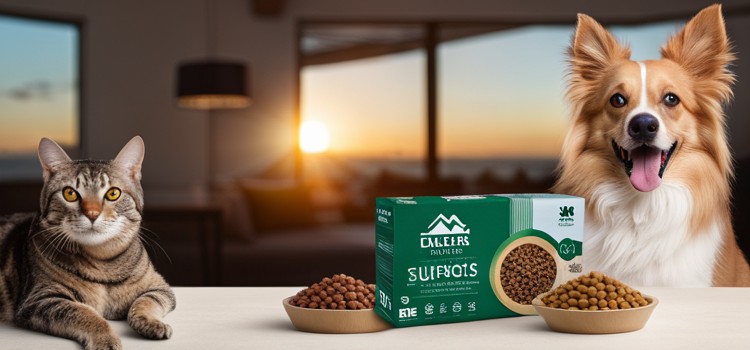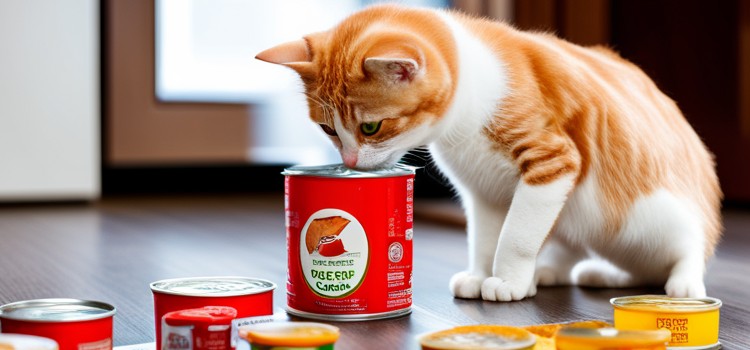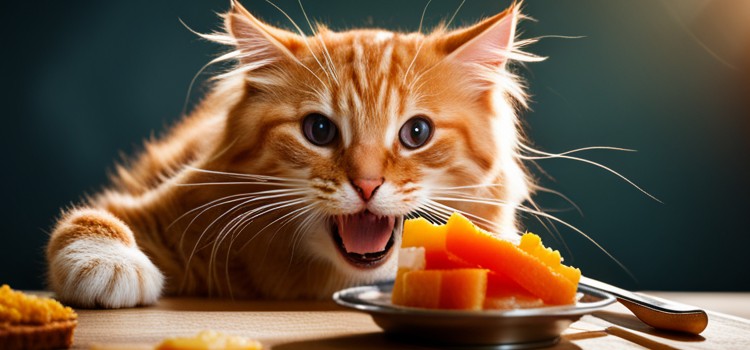As an Amazon Associate committed to the mission of improving the lives of our readers, Live-Clear.com receives a small commission from eligible purchases made through our affiliate links. This revenue enables us to keep producing insightful articles and other material.
If a cat eats maggots, it can lead to an infestation of internal parasites and bacteria that can cause serious health issues for the cat. Maggots are a common sight during the summer months, and cats may be attracted to them as a potential food source.
However, consuming maggots can have harmful effects on a cat’s health. Ingesting maggots can cause digestive issues such as vomiting and diarrhea, as well as an array of serious health problems caused by internal parasites and harmful bacteria. These health problems can include dehydration, anemia, and even death in severe cases.
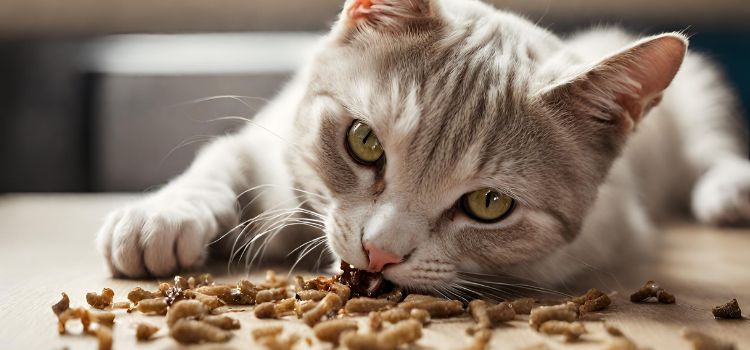
It is important to monitor your cat’s behavior and diet, and seek veterinary attention if you suspect they have consumed maggots to ensure their health and well-being.
Why Do Cats Eat Maggots?
Cats may eat maggots because they are attracted to their movement, smell or taste. However, consuming maggots can lead to an increased risk of intestinal parasites or bacterial infections, which can cause health issues. It is important to keep an eye on your cat and seek veterinary attention if symptoms arise.
Cats are carnivorous animals that typically eat meat. When it comes to eating maggots, there are several reasons why a cat may do so. Here are a few possible explanations:
Instinctual Behavior
Cats are natural hunters, and their instincts drive them to catch and eat prey. Maggots are a common food source for wild cats, and even some domestic cats may exhibit this instinctual behavior.
Hunger And Malnourishment
Cats that are hungry or malnourished may resort to eating maggots or other unappealing things to satisfy their cravings. This behavior is more common in stray or feral cats who don’t have a reliable source of food. If your cat eats maggots, it’s important to monitor them for any signs of illness or digestive upset. Additionally, you should try to encourage your cat to eat a healthy, balanced diet to prevent them from resorting to eating unconventional foods.
Can Maggots Harm Cats?
Maggots are fly larvae and not toxic to cats. However, it’s recommended that cats shouldn’t eat maggots as there is a chance it may lead to bacterial infections or an upset stomach. If the cat has eaten maggots, it’s best to monitor them for any symptoms and to contact a veterinarian if needed.
Cats are curious creatures and have a tendency to eat things that are not suitable for their digestive system. Maggots are one such thing that cats may come across and can harm them. Maggots are fly larvae that feed on decomposing flesh, and their consumption can lead to various health risks and dangers for cats.
Types Of Maggots
Maggots can be of different types, and each of them may have varying effects on cats. Some of the common types of maggots that cats may consume are:
| Types of Maggots | Effects on cats |
|---|---|
| Flesh-eating maggots | Can cause tissue damage or infection |
| Botfly maggots | Can cause skin irritation and discomfort |
| Blowfly maggots | Can cause diarrhea, vomiting, or other digestive problems |
Health Risks And Dangers
The consumption of maggots can lead to various health risks and dangers for cats, including:
- Possible poisoning: Maggots that feed on toxic or contaminated substances can carry toxins that can harm cats. Consumption of such maggots can lead to poisoning in cats.
- Tissue damage or infection: Flesh-eating maggots can cause damage to the tissue surrounding the area, leading to infection and other health problems.
- Intestinal blockage: Consuming maggots can lead to an intestinal blockage in cats, leading to digestive problems such as vomiting or diarrhea.
It is crucial to keep a watchful eye on your cat and ensure they are not consuming maggots. If your cat has consumed maggots, it is essential to contact your veterinarian immediately, as they may need medical attention.

Symptoms Of Maggot Infestation In Cats
Maggot infestation in cats can cause horrifying symptoms such as vomiting, diarrhea, and lethargy. Consumption of maggots can also lead to severe health complications, including bacterial infections and intestinal blockages. It is crucial to seek immediate veterinary attention if a cat displays any signs of maggot infestation.
Maggot infestation, also known as myiasis, can be a common problem in cats, especially those with open wounds or skin issues. If left untreated, maggots can spread rapidly and lead to life-threatening conditions such as septicemia. It is, therefore, essential to recognize the symptoms of maggot infestation in cats so that you can take immediate action.
Physical Symptoms
One of the most noticeable physical symptoms of maggot infestation in cats is the presence of maggots on their skin or in the affected area. Maggots are tiny, white, worm-like organisms that can quickly multiply and cause damage to the skin and tissue. You may also notice redness, swelling, and inflammation around the affected area, and your cat may show signs of discomfort or pain.
Behavioral Changes
Cats with maggot infestation may display behavioral changes such as lethargy, loss of appetite, and reluctance to move or groom themselves. They may also become agitated or irritable and vocalize more often than usual. In some cases, cats may even develop a fever, which can indicate a more severe underlying condition. If you notice any of these symptoms in your cat, it is essential to seek veterinary care immediately. Treatment for maggot infestation typically involves removing the maggots, cleaning and dressing the affected area, and administering medication to prevent infection. With prompt treatment, most cats can make a full recovery and return to their normal activities.
How To Prevent Cats From Eating Maggots
If a cat eats maggots, it can lead to various health issues such as vomiting, diarrhea, and infections. To prevent this, make sure to dispose of any trash regularly, keep the cat’s litter box clean, and provide them with a healthy and balanced diet. Additionally, regular visits to the vet can help ensure their overall health and well-being.
Cats are natural hunters, and they love to play with objects that happen to move. Unfortunately, some of these creatures can be dangerous to your pet’s health, including maggots. Maggots are the larval stage of flies and can be found on decaying organic matter such as garbage, rotten food, and feces. If your cat eats maggots, it can lead to serious health problems such as vomiting, diarrhea, and even sepsis. Therefore, as a responsible pet owner, it’s essential to take necessary precautions to prevent your furry friend from eating these hazardous creatures.
Proper Waste Disposal If A Cat Eats Maggots
One of the most effective ways of preventing your cat from eating maggots is by ensuring proper waste disposal. Maggots thrive in moist and decaying organic matter such as unsealed garbage bins, dirty litter boxes, and dead animals. To prevent maggots from accumulating in the first place, make sure you dispose of your waste in airtight containers and keep your cat away from areas where there’s a likelihood of eggs hatching.
Regular Inspections If A Cat Eats Maggots
Inspect your surroundings regularly to ensure that there’s no decaying matter around your house or garden that could attract flies and lead to a maggot infestation. If you have a compost pile, ensure that it’s well-managed and adequately sealed to prevent attraction to flies. Routine inspections help you identify potential problem areas, and you can take the necessary steps to address them before they become a health hazard.
Preventing your cat from eating maggots requires proper waste disposal and regular inspections, among other measures. By taking these precautions, you can protect your furry friend from exposure to harmful bacteria and diseases. Remember, a little prevention goes a long way in keeping your pet healthy, happy, and safe.

What To Do If Your Cat Eats Maggots
If you’re a cat owner, you know that curious feline can get into just about anything. Whether it’s sniffing around the garbage can or exploring the great outdoors, cats have a knack for finding trouble. One of the lesser-known dangers that cats can encounter is maggots. If your cat eats maggots, there are a few things you need to do to ensure their health and safety.
Immediate Actions If A Cat Eats Maggots
The first thing you need to do if you suspect your cat has eaten maggots is to observe them closely. Look for any signs of distress or discomfort, such as vomiting, diarrhea, or lethargy. If your cat seems fine, you should still take some precautions to make sure they aren’t in any danger.
Begin by removing any remaining maggots from your cat’s food bowl or wherever else they may have found them. Maggots can carry harmful bacteria, so it’s important to clean the area thoroughly to prevent any potential health risks.
You should also offer your cat clean water to drink and keep an eye on them for the next few days. If your cat shows any signs of illness, don’t hesitate to call your veterinarian.
Consulting A Veterinarian If A Cat Eats Maggots
If you’re not sure whether your cat has eaten maggots or if they’re showing signs of illness, it’s important to seek veterinary care right away. Your veterinarian can perform a physical exam to check for any signs of infection or health issues and may recommend additional tests or treatment if necessary.
In some cases, your veterinarian may prescribe antibiotics or other medications to help your cat recover from any potential infections caused by eating maggots. They may also offer advice and guidance on how to prevent your cat from eating maggots or other harmful substances in the future.
Preventing Future Incidents If A Cat Eats Maggots
While it’s impossible to completely protect your cat from all potential hazards, there are some steps you can take to reduce their risk of eating maggots or other dangerous substances.
- Store all food securely and in sealed containers.
- Regularly clean your cat’s food and water bowls.
- Dispose of garbage properly to prevent maggots from forming.
- Keep your cat indoors or supervise closely while they’re outside.
- Regularly deworm your cat to prevent them from eating maggots or other parasites.
By taking these simple precautions, you can help keep your cat safe and healthy and reduce the likelihood of any future incidents involving maggots.
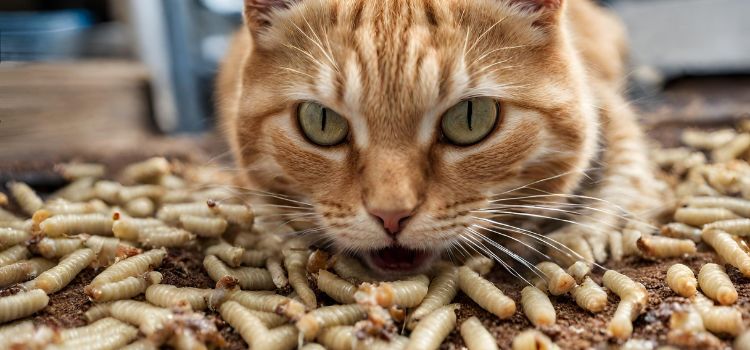
Conclusion
To conclude, it’s safe to say that maggots are not toxic to cats. However, consuming them can lead to health issues, especially if the maggots carry disease-causing bacteria. It’s essential to monitor your cat’s behavior and appetite and provide a balanced diet to prevent them from straying to undesirable food sources.
Frequently Asked Questions Of What Happens If A Cat Eats Maggots
Maggots can be fatal to cats. If a cat ingests a maggot, it can lead to a serious condition called myiasis. The maggots can burrow into the cat’s skin and cause tissue damage, infection, and even death. It is important to seek immediate veterinary care if you suspect that your cat has ingested maggots.
Maggots in cats can be treated by seeking veterinary care immediately. The vet will remove the maggots, clean and disinfect the affected area, and prescribe antibiotics and pain relief medication. Proper wound care and prevention methods must also be implemented.
It is not possible for fly eggs to hatch in a cat’s stomach. The acidic environment and digestive juices in a cat’s stomach would kill any eggs that were ingested. Additionally, fly eggs cannot survive in a mammalian host and require a specific substrate to develop into larvae.
The presence of maggots in your cat’s food may be due to poor storage conditions or contaminated raw meat. Ensure that you store the cat’s food appropriately and purchase from reputable sources. Discard any food with maggots and seek veterinary advice if your cat exhibits any signs of illness.
Cats can get sick from eating maggots as they may carry harmful bacteria and parasites.
In case of any unusual symptoms, consult a veterinarian for immediate care. With responsible pet ownership, your furry friend can stay healthy and happy for a long time.
Amazon and the Amazon logo are trademarks of Amazon.com, Inc, or its affiliates.
